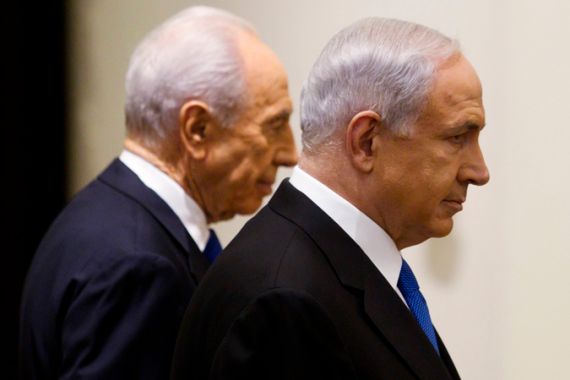Netanyahu asked to form new government
Israeli prime minister has four weeks to forge a coalition, which he says will focus on security issues and the economy.

Israeli president Shimon Peres has asked prime minister Binyamin Netanyahu to form the country’s next government after holding talks with the parties elected to parliament in last month’s election.
Netanyahu now has four weeks to form a coalition government, with a possible 14-day extension if needed. If he succeeds, he will begin his third term as the Israeli premier.
A majority of newly elected lawmakers had recommended Netanyahu as prime minister-designate. His Likud party, which ran on a joint list with the ultra-nationalist Yisrael Beiteinu, won a total of 31 seats in the 120-member Knesset.
At a televised news conference, Netanyahu said the government’s top priority should be to prevent Iran from building a nuclear weapon. He also said the government should “deal with another deadly weapon being stockpiled near us and threatening our cities and civilians,” an obvious reference to weapons caches in Syria.
An attack on a weapons convoy in Syria this week has been widely attributed to Israel, though Israel has not commented on the matter.
Netanyahu also said that his next government would be “committed to peace,” and called on Palestinian Authority president Mahmoud Abbas to “come back to the neogtiating table.”
Talks between the two parties have been stalled since 2010, partly because of Israel’s refusal to halt the growth of illegal settlements in the occupied West Bank and East Jerusalem.
‘We have to unite’
Netanyahu’s would-be coalition partners will largely be focused on domestic issues, though.
The surprise performer in last month’s election was former television journalist Yair Lapid’s new Yesh Atid party, which won 19 seats. He ran on a platform of lowering the cost of living and ending the long-standing military draft exemptions granted to Israel’s ultra-Orthodox Jewish community.
The latter demand could make it difficult for Lapid to join a coalition with ultra-Orthodox parties like Shas.
But Netanyahu said that he wants a broad governing coalition that will bring stability to the government and allow it to confront these challenges.
“At a time when there are so many forces trying to splinter Israel, we have to unite,” Netanyahu said.
Another likely coalition partner is the Jewish Home party headed by Naftali Bennett, a religious-nationalist party which is fiercely opposed to talks with the Palestinians.
The centrist Kadima party, which in the outgoing Knesset held 28 seats but only won two in last month’s election, has also hinted that it will join the coalition.